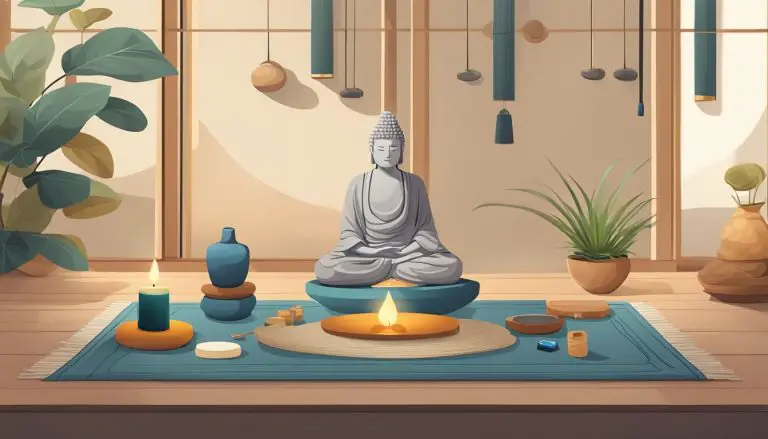What Happens During a Meditation Retreat?: A Guide to the Experience
Meditation retreats offer a unique opportunity to unplug from the daily grind and focus on inner peace and self-discovery. As someone who has attended several meditation retreats, I can attest to the transformative power of these experiences.
During a meditation retreat, participants are immersed in a supportive environment that fosters mindfulness, compassion, and personal growth.

- Understanding Meditation Retreats
Meditation retreats come in many different forms, from silent retreats to those that incorporate movement or other practices. The goal of all retreats is to provide a dedicated space for participants to deepen their meditation practice and cultivate greater awareness. Retreats can range in length from a weekend to several weeks or even months.
- Preparing for the Retreat
Before attending a meditation retreat, it’s important to set clear intentions and expectations. This may involve clarifying your goals for the retreat, researching different retreat options, and making any necessary travel arrangements. It’s also important to prepare physically and mentally by eating well, getting enough rest, and minimizing distractions in the days leading up to the retreat.
Key Takeaways
- Meditation retreats offer a supportive environment for personal growth and mindfulness.
- Retreats come in many different forms and can range in length from a weekend to several weeks or months.
- Preparing for a meditation retreat involves setting clear intentions, researching different options, and taking care of your physical and mental health.
Understanding Meditation Retreats
Purpose and Benefits
Meditation retreats are a great way to disconnect from the world and focus on your inner self. The purpose of a meditation retreat is to provide an environment where one can practice meditation in a peaceful and secluded setting. The benefits of meditation retreats are numerous. They help to reduce stress, improve mental clarity, and increase overall well-being.
During a meditation retreat, one can expect to spend a significant amount of time in meditation. This can range from a few hours to several days. The retreats are designed to provide a supportive environment where one can deepen their meditation practice and gain a better understanding of themselves.
The benefits of meditation retreats are numerous. They help to reduce stress, improve mental clarity, and increase overall well-being. By disconnecting from the world and focusing on your inner self, you can gain a better understanding of your thoughts and emotions. This can lead to a greater sense of peace and happiness in your daily life.
Types of Retreats
There are many different types of meditation retreats available, each with its own unique focus and approach. Some retreats are designed for beginners, while others are more advanced. Some retreats are focused on a specific type of meditation, such as Vipassana or Buddhist meditation, while others are non-religious.
Silent retreats are also a popular type of meditation retreat. During a silent retreat, participants are asked to refrain from speaking and other forms of communication. This can help to deepen the meditation practice and provide a greater sense of inner peace.
In summary, meditation retreats are a great way to deepen your meditation practice and gain a better understanding of yourself. They provide a supportive environment where one can disconnect from the world and focus on their inner self. With so many different types of retreats available, there is something for everyone.
Preparing for the Retreat
As I prepare for my upcoming meditation retreat, I find it helpful to consider some key factors to ensure a smooth and enjoyable experience. Here are some tips to help you prepare for your own retreat:
What to Bring
Packing the right items can make all the difference in your comfort and enjoyment during the retreat. I recommend bringing comfortable clothing that allows for ease of movement, such as loose-fitting pants and a lightweight top. A yoga mat can also be useful for meditation sessions, and a refillable water bottle is essential to stay hydrated throughout the day. Additionally, consider bringing any personal items that will help you feel more at ease, such as a favourite book, journal, or small blanket.
Setting Intentions
Before embarking on the retreat, it can be helpful to set clear intentions for what you hope to gain from the experience. This might involve reflecting on your current state of mind and identifying areas where you could benefit from greater clarity or insight. Write down your intentions and keep them in mind throughout the retreat, allowing them to guide your practice and focus.
Mental and Physical Preparation
In order to get the most out of the retreat, it’s important to prepare both mentally and physically. This might involve practicing meditation in the weeks leading up to the retreat, as well as engaging in other practices such as yoga or mindfulness exercises. Additionally, it can be helpful to adjust your diet in the days leading up to the retreat, focusing on whole foods and avoiding caffeine or other stimulants that may interfere with your ability to relax and focus.
By following these tips, you can ensure that you are fully prepared for your meditation retreat and able to get the most out of the experience.
At the Retreat
When I arrived at the meditation retreat, I was given a schedule for each day. The schedule was well-organised and structured to maximise the benefits of the retreat.
Daily Schedule
The daily schedule consisted of guided meditation sessions, yoga classes, and teacher-led lectures. We were expected to follow the schedule strictly to maintain the focus and discipline required for the retreat. The schedule also allowed for ample free time to reflect and recharge.
Activities and Practices
The retreat offered a variety of activities and practices to help us deepen our meditation practice. We had the opportunity to participate in walking meditation, mindful eating, and group discussions. These activities helped us to develop mindfulness in different areas of our lives.
Teacher-Led Sessions
The teacher-led sessions were a highlight of the retreat for me. The teachers were experienced and knowledgeable, and their lectures were insightful and thought-provoking. They provided guidance and support throughout the retreat, helping us to overcome any challenges we faced.
Overall, the retreat was a transformative experience for me. The structured schedule and variety of activities helped me to deepen my meditation practice and develop mindfulness in all areas of my life. The teachers provided valuable guidance and support, and the community of like-minded individuals made the experience even more rewarding.
Integration and Aftercare

After a meditation retreat, it is important to take some time to integrate the insights and experiences gained during the retreat into daily life. This period of integration and aftercare is crucial for maintaining the benefits of the retreat and ensuring that the insights gained are not lost.
Post-Retreat Reflection
One of the most important things to do after a meditation retreat is to take some time to reflect on the experience. This can involve journaling, talking to others who attended the retreat, or simply spending some time in quiet contemplation. By reflecting on the retreat, we can gain a deeper understanding of the insights gained and how they can be applied to daily life.
Applying Insights to Daily Life
Once we have reflected on the retreat, it is important to start applying the insights gained to daily life. This can involve making changes to our daily routines, relationships, and habits. For example, if we gained insight into the importance of self-care during the retreat, we might start prioritising activities such as exercise, meditation, or spending time in nature.
It is also important to maintain a regular meditation practice after the retreat. This can help to reinforce the insights gained during the retreat and ensure that we continue to experience the benefits of meditation in daily life.
Overall, the period of integration and aftercare after a meditation retreat is a crucial part of the process. By taking the time to reflect on the experience and apply the insights gained to daily life, we can continue to experience the benefits of the retreat long after it has ended.
Choosing the Right Retreat

When it comes to choosing a meditation retreat, there are a few things to consider. Here are some tips to help you find the right retreat for you.
Research and Recommendations
It’s important to do your research before committing to a retreat. Look for reviews and recommendations from others who have attended the retreat. Check out the retreat centre’s website and read up on their credentials and level of experience.
I found that there are many online resources available where you can find reviews and recommendations for meditation retreats. Websites like Tripadvisor and Yelp can be helpful in finding honest reviews from previous attendees. Additionally, there are many blogs and forums where people share their experiences and recommendations for retreat centres.
Evaluating Retreat Centres
When evaluating retreat centres, consider factors such as location, amenities, and budget. Look for a retreat centre that is in a peaceful and quiet location, away from distractions. Check if the centre offers any amenities that are important to you such as private rooms, healthy meals, and access to nature.
I found that many retreat centres offer different types of retreats at varying price points. It’s important to consider your budget and find a retreat that fits within your financial means. Some retreat centres may also offer scholarships or payment plans to help make the retreat more affordable.
In conclusion, choosing the right meditation retreat requires some research and evaluation. By taking the time to consider your options and finding a retreat that fits your needs and budget, you can have a fulfilling and transformative experience.
Frequently Asked Questions
What activities are typically included in a meditation retreat?
During a meditation retreat, participants typically engage in various activities such as meditation, yoga, mindful walking, and mindful eating.
The schedule is often structured with alternating periods of sitting and walking meditation, as well as group discussions and talks on mindfulness and meditation.
How can one determine if a meditation retreat is a valuable experience?
The value of a meditation retreat depends on an individual’s personal goals and motivations for attending.
It is important to research the retreat beforehand to ensure it aligns with your needs and expectations.
Reading reviews from previous participants can also provide insight into the retreat’s effectiveness.
What should one pack for a stay at a mindfulness retreat?
It is recommended to pack comfortable clothing suitable for meditation and yoga, as well as any necessary toiletries and medications.
Some retreats may require participants to bring their own meditation cushion or yoga mat, so it is important to check the retreat’s guidelines beforehand.
What are the usual daily practices at a meditation retreat?
The daily practices at a meditation retreat typically involve several hours of meditation, mindful movement practices, and group discussions.
There may also be opportunities for one-on-one meetings with the retreat leader or teacher.
Can beginners participate in meditation retreats, and what should they expect?
Beginners are welcome to participate in meditation retreats, but it is important to choose a retreat that caters to beginners and provides adequate support and guidance.
Participants should expect to spend several hours each day in meditation and to follow a structured schedule.
What are the potential benefits of attending a meditation retreat?
Attending a meditation retreat can provide numerous benefits, including increased mindfulness, reduced stress and anxiety, improved emotional regulation, and greater self-awareness.
However, it is important to note that the benefits may vary depending on the individual’s level of commitment and willingness to engage in the practices.






